











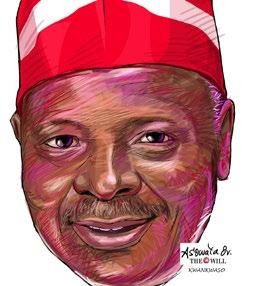


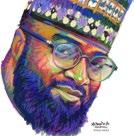

















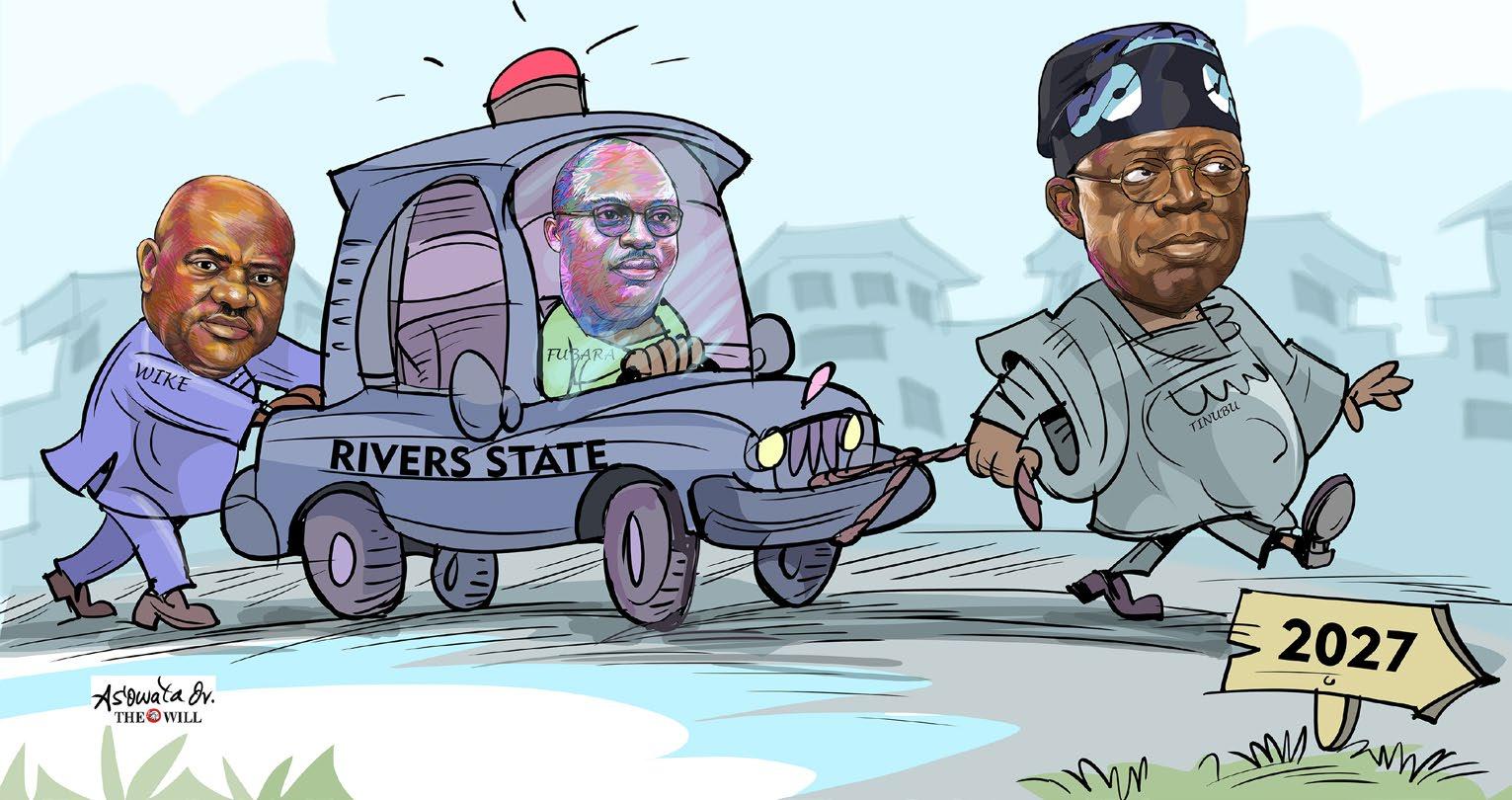

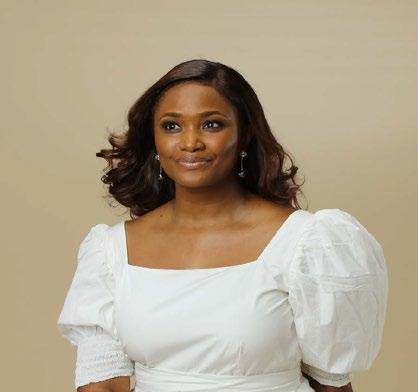
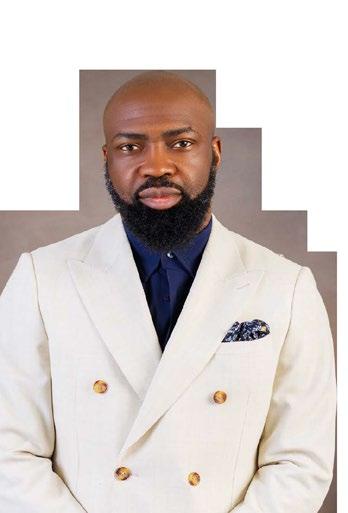





Co-founders of Chocolate City, Audu Maikori and Paul Okeugo, mark two decades of the company this year. Looking back, they recall one of their defining moments: signing M.I. Abaga and the release of Talk About It in 2008. According to Maikori, that album became a cultural reset, shifting the perception of Nigerian rap and Afrobeats entirely. It demonstrated that Nigerian music could be both lyrically sharp and commercially viable, and globally appealing. They knew it was risky to centre a new sound around a rapper at a time when the market was dominated by dancehall and pop. Still, they backed their conviction with a strategic approach of aggressive digital marketing, nationwide tours, and building an entire narrative around artistry. Another pivotal moment was when they decided to professionalise the music business: at a time when most labels were informal collectives, they implemented contracts and royalty structures.
Read about Audu Maikori and Paul Okeugo on pages 8 through 10 of this issue.
Many people think the colour brown is dull and uninteresting, but it depends on the colour you pair it with. When paired right, it can be very stylish. Our fashion pages suggest colours that pair nicely with brown. See pages 4 and 5.
In the past, having a skincare routine was often seen as a feminine pursuit. However, nowadays, more men are embracing this beauty ritual, understanding the importance of taking care of their skin. The good part is that you don’t need to splurge on many products; just a few to start with will do the trick. We list the products you need on page 12.
Don’t forget to download the playlist on page 16. You’ll enjoy the selection.
Until next week, enjoy your read.








SUNDAY, SEPTEMBER 21, 2025


SUNDAY, SEPTEMBER 21, 2025




BY AMOS ESELE
The first sign of the disconnect between Rivers State Governor Siminalayi Fubara and some of his key loyalists and supporters was the reception scheduled for Thursday, September 18, 2025, which failed to take place due to his absence. The crowd that had gathered to welcome him back to the state after the restoration of democratic governance, went home disappointed.
Among the governor's close allies were top political leaders, such as his former Chief of Staff Edison Ehie, Evans Bipi, Commissioner for Physical Planning and Urban Development, sacked Local Government Chairmen Obio/Akpor, Chijoke Ihunwo, his Port Harcourt City counterpart, Ezebunwo Itche-Mati, who led their colleagues and the crowd collectively known as Simplified.
Commissioners and the governor’s kinsmen from the Ijaw ethnic group.
“Let me first of all appreciate the wonderful people of Rivers State. I’m really humbled by what I saw at the airport. I was briefed on some photographs of what happened here yesterday. That reception really humbled me,” the governor told the crowd that welcomed him, though they included a former CommissionerforInformationandCommunications, Barr. Emma Okah; former Commissioner for Health, Dr Adaeze Oreh; former Nigerian Ambassador to the Netherlands, Oji Ngofa; former Commissioner for Environment, Sydney Gbara; and former factional Speaker of the State House of Assembly, Victor OkoJumbo.
THEWILL gathered that Fubara's Chief of Staff, Ehie, Bipi and a media influencer, called Sotanye Fulton had his ears and eyes during the stormy days that preceded the declaration of Emergency rule by President Bola Tinubu on March 18, 2025. But a day after the restoration of suspended democratic structures, the out-going Sole Administrator, Vice Admiral Ibok-Ete Ibas (retd.) had officially announced the handover of the reins of administration to Governor Fubara, his staunch supporters could only anticipate his whereabouts.
On Friday when he finally hit the state, the same confidants were among a larger crowd of former
Others present were former Commissioner for Youths, Chisom Gbali; former Commissioner for Physical Planning and Urban Development, Evans Bipi; former President of NUPENG, Igwe Achese; former Commissioner for Education, Dr. Tamunosisi GogoJaja; as well as former chairmen of Port Harcourt City LGA, Ezebunwo Ichemati, and Obio/Akpor LGA, Chijioke Ihunwo.
“The governor accepted all the terms and conditions of the peace talks and it will be the height of foolishness if he were to renege on them,” a top government source told this newspaper on Friday, adding, “If anyone thinks they are going to influence him, I will say good luck to such a person. It is true





Territory Minister, Nyesom Wike, the final hurdle to his smooth take-off.
That hurdle was the appointments of key officials in the state. THEWILL investigation shows that Wike will appoint the Chief of Staff, while the list of Commissioner-nominees will be shared.
Political patronage in Nigeria often serves to empower loyalists or emasculate them when excluded. To keep some of his key supporters, the governor will be allowed to nominate some commissioners alongside the minister.
The FCT minister has however denied having any hand in the nomination of commissioners. He told national television last week that he had no hand in the appointment of Commissioners.
Wike said: “I cannot impose anything on the governor. Why should I impose anything on the governor? Assuming I go to the governor and he says no, will the state collapse?
I will not and I have no candidate, even if the governor comes to me now and said we have agreed to work together, which is natural. I will say 'look I give you a free hand to pick what you want for the state.
“All I want to say is I know what I did and what I have done to keep the state to this level, don’t drop it, move ahead. As I speak to you, I left the state where we can compete favourably with Lagos and I can challenge anybody.”
A chieftain of the APC in the state, Tonye Cole, however argued that the peace deal, the recently conducted LGA polls have emasculated Governor Fubara. Cole, the APC governorship candidate in the 2023 election, said in a TV interview that Fubara has returned to office after six months of emergency rule with “zero powers.”
“My prayer is that as we come back, because we don’t know what we’re going to see starting from tomorrow, the one thing that we are sure of is that the governor is not in a position to make any decisions,” he said, adding, "With the details of the peace deal still unclear, I cannot tell the extent or the limits of the powers that he has now.”
Cole urged the governor to sit with Wike and decide what will be the limits of his powers in the current circumstance.

However, the submission of the Commissionernominees list by the governor for screening and confirmation was a key decision taken by the Rivers State House of Assembly during its first plenary after six months of emergency rule. Speaker Martin Amaewhule presided over the meeting held at the Conference Hall of the Legislative Quarters in Port Harcourt on Thursday.
Other requests to the governor included a submission of Rivers State Appropriation Bill, while noting that members would review how funds were spent during the six months of emergency rule. The Speaker emphasised that the demands were in line with the peace agreement.
“The House resolved to call on Governor Siminialayi Fubara to forward the list of commissioner-nominees to the House for screening and confirmation in line with the Constitution and the terms of the peace parley,” Amaewhule said, in a statement issued by his Special Assistant on Media, Martins Wachukwu. Amaewhule added: “Going forward, the House will work with the governor and abide by the terms of the peace parley and the provisions of the Constitution of the Federal Republic of Nigeria in the interest of peace and good governance in the State.”
rights of others should be avoided. Governor Fubara may have learnt his lessons, having fallen out with his godfather. Rivers people deserve good governance now.”

The eight-point peace agreement brokered by President Tinubu and other relevant stakeholders at a crucial meeting in the Presidential Villa, Abuja in June included: All matters instituted in the courts by Governor Fubara and his team, in respect of the political crisis in Rivers State, shall be withdrawn immediately; All impeachment proceedings initiated against the governor of Rivers State by the Rivers State House of Assembly should be dropped immediately; The leadership of the Rivers State House of Assembly as led by the Amaewhule shall be recognised alongside the 27 members who resigned from the PDP; The remuneration and benefits of all members of the Rivers State House of Assembly and their staff must be reinstated immediately and the governor of Rivers State shall, henceforth, not interfere with the full funding of the Rivers State House of Assembly.
Amid the renewal of democratic governance in the state, stakeholders and pundits have suggested a series of lessons to be drawn from the emergency rule.
According to a Senior Advocate of Nigeria, SAN, Monday Ubani, there are legal, political and personal lessons. Speaking with THEWILL on Friday, he said that the overriding interest of the people should henceforth guide the actions of elected, appointed and interested parties in the state.
He said, “Now that democratic structures have been restored in the state, I will advise all the involved parties to allow the interests of the people to override all other interests. Accountability should be to the people and unnecessary demands that lead to the denial of the
“
Our leader, Nyesom Wike, all members of the Rivers State House of Assembly and I as your governor have all accepted to bury the hatchet and embrace peace and reconciliation in the best interest of our dear state
Ubani who argued that the constitutionality of emergency rule was still a subject of debate between what he called the interventionist school who support the suspension of compromised political actors such as the late Prime Minister Tafawa Balewa did in 1962 in the old Western Region, former President Olusegun Obansanjo repeated in Plateau State in 2004 and Ekiti in 2006 and President Tinubu did on March 18, 2025 Rivers State and the preservationist school who support retaining elected institutions thereby strengthening constitutionalism as ex-President Goodluck Jonathan did in Adamawa, Borno and Yobe State in 2013, urged the various interests in Rivers State to march on for the sake of peace.
“The Supreme Court of Nigeria may not revisit the constitutionality of the President’s action, as it appears for now to be an academic exercise. What President Bola Tinubu enjoys, however, is not judicial precedent but deep political precedent, stretching back to 1962.”
The Senior Advocate of Nigeria, added.
Mr Epelle simply said, “Democracy has spoken,” explaining further that "those who say the President did us a favour by restoring democratic structures are wrong. His hands were tied, there is nothing else he could have done about it than to restore democratic structures. No elected individual has the right to circumvent the process that brought him to power. I think this should serve as a deterrent that we should learn to keep our democratic values.”
Asked as an indigene of Rivers State if he foresees any challenges ahead, he said, “Your guess is as good as mine. Honesty is one of the things that guides a process and when there is no such thing, it is always problematic.”
Shortly after resuming office on Friday, Governor Fubara addressed the people of Rivers State in a broadcast, stating why he accepted to abide by the state of emergency, chose to cooperate with President Tinubu and settle his differences with Wike.
Among other things, he said, “As your governor, I accepted to abide by the state of emergency declaration and chose to cooperate with Mr President and the National Assembly, guided by my conviction that the sacrifice was not too great to secure peace, stability and progress of Rivers State.
“This was why I also resisted the pressure to challenge the constitutionality of the declaration of the state of emergency, the suspension of democratic institutions and all other actions that we endured during the difficult period,” he said.
“Our leader, Nyesom Wike, all members of the Rivers State House of Assembly and I as your governor have all accepted to bury the hatchet and embrace peace and reconciliation in the best interest of our dear state.”

President Bola Ahmed Tinubu, r, Aisha Buhari, l, her eldest son Yusuf, and other relatives and associates of late President Muhammadu Buhari during Tinubu's solidarity visit to the Kaduna residence the Buharis, on Friday.
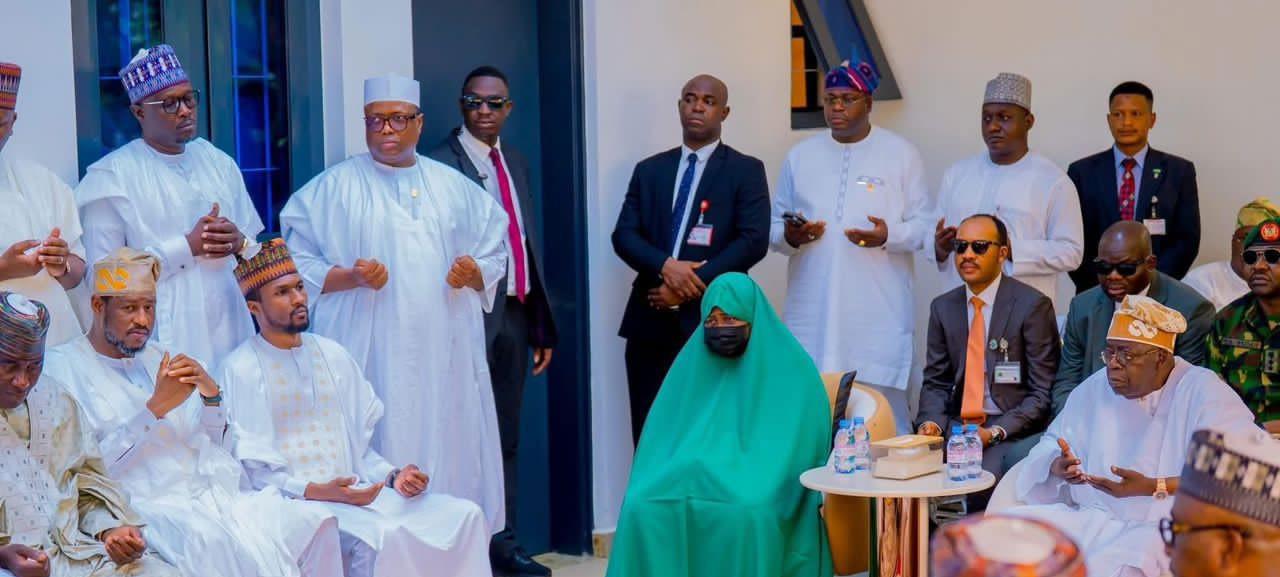
BY FELIX IFIJEH
President Bola Tinubu on Friday paid a condolence visit to the Kaduna residence of Nigeria’s late former President, Muhammadu Buhari, assuring the family that his administration would continue to uphold Buhari’s legacies of integrity, patriotism, and accountability.
Tinubu was received by Buhari’s widow, Aisha, their eldest son, Yusuf, and other relatives and associates of the late leader.
THEWILL had earlier reported that Buhari died on July 13 in London after a prolonged illness. Speaking during the visit, Tinubu said the late President’s values and contributions would continue to guide the nation.
“We are just here to assure you that we share in your grief, we share in your pain. A loss in flesh is not a loss in the spirit, and the spirit that he left with us is a spirit of hard work, dedication, patriotism, and honesty.
“We assure you and the entire family that we will continue with our leader’s legacy, the mark he made for Nigeria. We will continue on the path of honesty,
integrity, and great character that he imbued in us. May God help Nigeria, keep us united and together in the promised land,” Tinubu said.
In an emotional response, Mrs. Aisha Buhari thanked the President and his government for standing by the family during their mourning period, describing the visit as a source of consolation. “I would like to use this medium to thank you once again, the First Lady and the wife of the Vice President, for standing by me and my family,” she said.
She added that her late husband was known for honesty, integrity, and justice, urging Nigerians to emulate his virtues. “I pray for peace to reign in Nigeria, for unity in the country, and for you, President Tinubu, to carry on with my late husband’s legacy of honesty, integrity, tolerance, accountability, and justice,” she said.
The President was accompanied on the visit by the Senate President, Godswill Akpabio; Speaker of the House of Representatives, Tajudeen Abbas; Minister of Finance, Wale Edun; Minister of Budget and Planning, Atiku Bagudu; and the National Security Adviser, Nuhu
Ribadu. Also in the entourage were the governors of Kwara, Abdulrahman AbdulRazaq; Yobe, Mai Mala Buni; Borno, Babagana Zulum; and Sokoto, Ahmed Aliyu. Earlier in the day, Tinubu attended the wedding of Nasirudeen, son of Senator Abdulaziz Yari, at the historic Sultan Bello Mosque in Kaduna. Nasirudeen tied the knot with Safiyya Shehu Idris in a ceremony attended by prominent dignitaries, traditional rulers, business leaders, and politicians.
During the ceremony, Tinubu received the groom’s hand in marriage on behalf of the Yari family after the bride’s representative, Ibrahim Ashiru, confirmed payment of the N1 million dowry. The President commended both families for upholding noble traditions and urged the young couple to build their marriage on faith, love, and mutual respect.
Renowned cleric Sheikh Abdullahi Bala Lau and the Chief Imam of the mosque, Dr. Muhammad Suleiman, led prayers for the President, the couple, and the nation.


BY AMOS OKIOMA
The Nigeria Union of Local Government Employees (NULGE) has honoured Governor of Bayelsa State, Senator Douye Diri, as the Best Governor on Local Government Reforms in Nigeria. NULGE President, Comrade Aliyu Kankara, presented the award to the governor in Yenagoa during a conference on “Promoting Local Government Workers’ Welfare: The Bayelsa Model.”
Comrade Kankara said Governor Diri’s achievements include transforming the local government system in the state through the introduction of fiscal policy reforms that repositioned the third tier of government for better service delivery, staff welfare, regular promotions and financial benefits.
The NULGE president said implementation of N80,000 minimum wage for council workers and an additional 25 and 30 per cent salary increase as well as the government’s support to councils in the payment of primary schools teachers salary were some of the heartwarming testimonies of the union members. He described as unprecedented the governor’s timely payment of pensions and gratuities to local government retirees, saying Bayelsa was the first state in the country to pay retirement entitlements immediately after service.
He said: “The Governor of Bayelsa State has excelled where many other state governors have failed in human capital development by prioritising the welfare of workers in the state, particularly those at the grassroots level. “From available information, Governor Diri’s administration has paid over N20 billion as arrears of gratuity to retired workers in Bayelsa State since he was sworn in in 2020.”
National President of the Medical and Health Workers Union of Nigeria (MHWUN), Dr. Kabir Sani, also appreciated the governor for improving the lives of local government workers in the state, including those from his union. Governor Douye Diri, in his remarks, said regular payment of salaries to workers and gratuity to retirees were part of the reasons he was elected and should not be celebrated.
He revealed that he was initially accused of attempting to score cheap political points for doing the right thing in offsetting the backlog of gratuities, which dated back to 2007.
Governor Diri said the challenges he met on assuming office necessitated the reforms as several of the councils had huge financial deficits and relied on the state government for bailouts. He said his vision for government at all levels was to
secure the livelihood of the people, enhance food availability and generate more revenue.
He restated his directive to council chairmen to embark on farming in areas of comparative advantage in order to boost food supply in the state. His words: “The moment you retire at 60 or 65 years, you become a senior citizen and you are entitled to your gratuity. In other climes, it is taken for granted. Therefore we should not celebrate it.
“Initially, some persons queried it when I started immediately paying gratuities. They said previous administrations did not pay. “I reminded such critics that my father was a teacher, a headmaster. If not for the opportunity of a child like me, he would have died without his pensions and gratuity.
“Having that at the back of my mind, one of the priorities I had was to ensure that the backlog of gratuities were cleared. I recall a particular month we had a windfall in our allocation, I directed the payment of N7 billion for gratuity and pensions.”
He commended his deputy, Senator Lawrence Ewhrudjakpo, for effective supervision of the councils and for ensuring a proper implementation of the reforms.
Ogun State Federal Road Safety Corps (FRSC), Sector Commander, Akinwunmi Fashakin (3rd l), officers of the Command and newly promoted officers of the command, ACC. Clement.T. Akpenwuan; ACC. Sule Okloho; ACC. Esther. O. Adewoye; ACC. P.D. Gogomi; and ACC. Oladejo Temitope Adekunle, in Abeokuta on Friday, September 19, 2025.

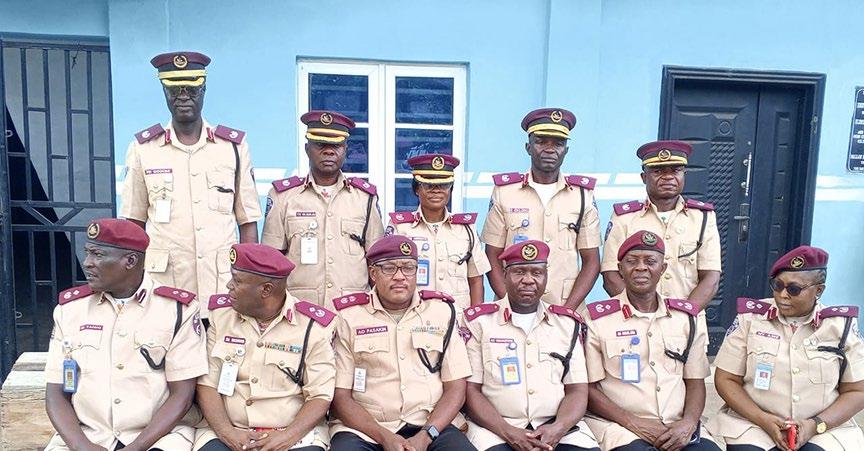
BY FELIX IFIJEH
President Bola Tinubu has reaffirmed Nigeria’s readiness to host a world-class 2030 Commonwealth Games, aiming to become the first African nation to achieve this historic milestone.
Nigeria and India are the two official bidders for the 2030 Games, with Abuja and Ahmedabad as their proposed host cities. The Commonwealth Games General Assembly will decide the host city in November 2025, after thorough evaluation of both bids.
Speaking during a visit by the Commonwealth Sport Bid Evaluation Committee to the Presidential Villa, in Abuja on Thursday, President Tinubu, represented by his Chief of Staff, Femi Gbajabiamila, reiterated Nigeria’s commitment to hosting an inclusive, diverse, and world-class 2030 Commonwealth Games on African soil.
Gbajabiamila held strategic meeting with the delegation led by Darren Hall, Commonwealth Director of Games and Assurance, and member of the 2030 Evaluation Commission. He emphasised that the Commonwealth champions unity and diversity, and Africa deserves its moment after nearly a century. The games have never been hosted in Africa since inception in 1930, making Nigeria’s bid historic and overdue.
“You’re very welcome to Nigeria. I hope you enjoy our great hospitality which we are known for, Mr President also asked me personally to convey his regards, he’s fully in support
of this bid. As I said the President has written a Letter of guarantee to you, he’s full weight is behind this bid. What I can assure you is that we’re ready. We’re willing, we’re able, and we actually want this. It’s been 100 years… The games have not been held on any soil in Africa.
“The element of inclusivity is what Commonwealth is, and we hope that to our benefit. You know, this administration has set some bold reforms to reposition sports. We see sports as a strategic driver of national development.
“The President intentionally scrapped the Ministry of Sports and created a National Sports Commission to drive sports development”, he said.
President Tinubu assured the delegation that all infrastructure, security, and hospitality needs will be met ahead of schedule. He stressed that Nigeria’s bid is not just about hosting but leaving a legacy for youth and national development. Shehu Dikko, Chairman of the National Sports Commission (NSC), made a strong case for Nigeria over India, stressing that Africa has 22 Commonwealth nations, and Nigeria as the giant of Africa deserves the honour.
“One thing I want to assure you is that the President sees the hosting of the Commonwealth Games in 2030, if we win the bid, as a celebration of the country’s growing force in sports, beyond just participation”, he said.
President of Commonwealth Sport, Nigeria, Habu Gumel. said the country is ready to host an environmentally sustainable Games. The Chairman of the Bid Committee, Mainasara Illo, who presented Nigeria’s proposal, highlighting key plans and innovations. He revealed that Nigeria proposes 15 sports, with football introduced to boost excitement, global visibility, and audience engagement.
Darren Hall, Commonwealth Director of Games and Assurance, thanked President Tinubu and the Nigerian team for their warm welcome. He said the Commonwealth, now comprising 56 nations, is aiming for greater diversity as it approaches its 100-year milestone. “I have been most thrilled by the passion of the Nigerian people in all their endeavors, including sports.”
The Minister of Information and National Orientation, Muhammed Idris, Minister of Aviation, Festus Keyamo, Minister of Art, Culture, Tourism, and the Creative Economy, Hannatu Musa Musawa, Minister of Housing and Urban Development, Ahmed Musa Dangiwa and Minister of Police Affairs, Ibrahim Gaidam, attended the meeting and made statements in support of the bid. They all assured of Nigeria’s readiness to host the Games, with each focusing on strategic sectors that will ensure a hitch-free sporting fiesta.
The Commonwealth delegation who are on a four-day visit will meet will key stakeholders and inspect key facilities.
The Imo Police Command says it has recorded great milestone in the fight against terrorism and violent crimes with the detention of 957 terror, armed robbery and kidnap suspects in two months.
The Commissioner of Police, Mr Aboki Danjuma, told newsmen in Owerri on Friday that nine kidnap victims and seven stolen children were also rescued and reunited with their family members.
“One of the major breakthroughs was the arrest of notorious IPOB/ESN terrorists and recovery of arms, ammunition and incriminating items. “Investigations further led to the arrest of some of their sponsors and financiers drastically reducing their nefarious activities and cutting off funding channels. “In synergy with other security agencies, the command also dislodged IPOB/ESN camps and kidnapping dens in Okigwe, Mbaitoli, Owerri West and Njaba Local Government Areas, and other areas in the state, striking a decisive blow to their capacity for
further attacks,” he said.
The police boss said: “On September 16, my men from the anti-kidnapping unit, led by ACP Oladimeji Odeyeyiwa, and the Special Intervention Squad, led by CSP Gboyako Adamu, stormed an IPOB/ESN camp at Obudi Agwa in Oguta LGA.
“The hoodlums engaged us in a fierce gunbattle but were overpowered by our superior firepower. “Sixteen suspects, including their sub-commander, Uzoechi Okechukwu, were arrested.” Danjuma further said that Uchechukwu Nwachukwu, 25, and Chinonso Ozuruigbo, 32, were currently under detention for alleged kidnap of Anayo Iwuoha, 48, on June 18, 2025 at Akabo, Ikeduru LGA.
“The suspects collected ransom of N3 million and were still demanding N10 million as condition for the victim’s release,” he said. The police boss said that following incessant kidnapping, armed robbery attacks and other heinous crimes, the command on September 9, arrested and detained a suspected member of IPOB/ESN,
Chukwuebika Eruruogu, 27. He alleged that Eruruogu was terrorising Mbaitoli, Njaba and Orlu LGAs before his detention.
Danjuma also said that four suspected members of a cult group were being detained over the death of Chidubem Orji, who was killed during an attempt to initiate him into the group. He said that items recovered from the suspects included some defunct Biafra currencies, N1,000 counterfeit notes used within their hideouts.
According to him, the command also recovered marijuana, laptops, cellphones, AK-47 rifles, pump action guns, ammunition, double-barreled guns, locally-fabricated pistols, charms, cartons of cartridges and a register used for training and roll calls.
“We have started blocking the channels where they get their weapons from,” he said.
He however said that his men sustained minor injuries throughout the two-month operation. (NAN)

The Force Public Relations Officer of the Nigeria Police Force, CSP Benjamin Hundeyin, has called for stronger collaboration between the media and the Police in the interest of national security and public trust.
Hundeyin made the call during a visit to the Nigeria Union of Journalists (NUJ), Federal Capital Territory (FCT) Council. He explained that his job as a Police spokesman would be difficult without strong support from the media.
“I cannot succeed in this role without the collaboration of the press,” he stated. Hundeyin used the occasion to call for balanced reportage, stressing that the ripple effect of negative stories can damage public confidence in the Police. “Policing relies heavily on information because Officers can’t be everywhere at once, which is why people’s tips and shared intelligence are so important. But when the public loses trust in us, those vital sources of information dry up, and that puts everyone at risk,” Hundeyin noted.
On our own part we will continue to do everything humanly possible to protect lives and property, “ he assured.
He added that insecurity in one part of the country can affect the whole nation. Hundeyin stressed that his message was not about controlling the press, but about encouraging balanced and responsible reporting.
“I am appealing to you today, help us build trust,” he said. “Let’s work together through open communication and partnership to make both the Police and the country stronger.” Hundeyin also promised to respond quickly and fairly to any issues journalists face while doing their work, especially in their interactions with Police officers.
In response, NUJ FCT Chairman, Comrade Grace Ike welcomed Hundeyin’s visit and expressed readiness to work closely with him. “On behalf of the NUJ FCT Council, I warmly welcome you,” she said. “We truly value this effort by the Police to connect with the media directly. It shows your commitment to open dialogue and better understanding.”
She went on to say: “The NUJ FCT does not tolerate any form of harassment or intimidation of journalists. Press freedom is a right, not a privilege. “As journalists, we recognise the
key role the Police play in keeping the peace and upholding the law. At the same time, the public needs timely, accurate, and honest information to have confidence in the Police and other security agencies.
“That’s why our relationship must be built on trust and cooperation. Together, we can stop the spread of misinformation and promote reporting that helps society move forward.”
Comrade Ike pledged the support of the NUJ FCT Council in working with the Police for the good of the public.
“We are ready to partner with you,” she said. “Let’s make sure information flows freely and responsibly, so that both our institutions can serve the people better.”
Hundeyin was warmly received by the NUJ FCT Chairman, Ms Grace Ike, along with other council members including Secretary Comrade Jide Oyekunle, Assistant Secretary Ms Sharon Emefia, Auditor Rosemary Ukoko-Tega, Financial Secretary Henry Daniel Abimiku, and Ex-Officio 1, Ebriku John Friday.
BY UDEME UTIP, UYO
The South-South youths in agriculture have received a major boost as key stakeholders in the sector, including the Nigerian Agribusiness and Agro-Industry Development Initiative (NAADI) and the Central Bank of Nigeria (CBN), pledged support to strengthen their structures and ensure access to funding for agribusiness projects.
Speaking at the official inauguration of the South-South Youth in Agriculture, Akwa Ibom State chapter, in Uyo on Thursday, the South-South Coordinator of NAADI, Mr Howard Usen, said the inauguration marked a turning point in youth participation in agriculture across the region.
According to him, NAADI will also partner with relevant expos and institutions to provide training for executives of the association across all local government areas of the state. He noted that the training would cover areas such as cooperative management, financial accountability, and the development of templates aligned with United Nations Industrial Development Organisation (UNIDO) standards.
“With these minimum standards, accessing funding from government agencies, development partners, and international organisations will no longer be difficult”, he added.
over into another cycle”, Inyiama explained, urging youths to take advantage of the scheme.
Also speaking, the State Commissioner for Agriculture, Dr Offiong Offor, represented by a director in the ministry, commended the resilience of the Youth in Agriculture programme, recalling that Akwa Ibom youths had consistently topped national competitions due to record cassava yields and innovative farming practices.
Usen stressed that many associations fail to attract meaningful funding due to lack of structure and proper governance frameworks. He explained that NAADI, in partnership with the Federation of Agricultural Communities of Nigeria, will assist the newly inaugurated body in developing covenants and operational standards that would meet global best practices.
In a goodwill message, the Head of Development Finance at the CBN, Uyo branch, Mr Obinna Inyiama, assured that the apex bank was fully committed to supporting agric-related projects, particularly for youths.
She assured that the ministry would continue to provide improved seedlings and technical support in line with Governor Umo Eno’s ARISE Agenda on food security.
She, however, advised the new leadership of the youth body to always submit requests in good time to ensure timely delivery of inputs.
“If you don’t have structure and good covenants, most organisations will not fund you. But once these structures are in place, it becomes easier for organisations and agencies to support and invest in you. We are committed to helping this body establish these standards”, Usen disclosed.
He highlighted the Agricultural Credit Guarantee Fund Scheme as a key intervention window through which farmers could access loans of up to N1 million from Microfinance Banks (MFBs). He explained that CBN would guarantee 75 percent of the loan value in case of default, thereby de-risking lending to young farmers.
“The facility can last up to one year, and beneficiaries who meet repayment obligations can reapply. With just 40 percent of the interest amount paid by CBN even as farmers can roll

The event climaxed with the formal inauguration of the Akwa Ibom State chapter executive, led by Mr Sylvester Edet Sunday, who pledged to mobilise young people across the state to embrace agriculture as a sustainable pathway to prosperity.
The inauguration, stakeholders noted, signals a new era of institutional backing for South-South youths in agriculture, with renewed hopes for access to credit, capacity building, and improved productivity.


Force Public Relation Officer of the Nigeria Police Force, CSP Benjamin Hundeyin (m), NUJ FCT Chairman, Comrade Grace Ike (4th r), Secretary, Comrade Jide Oyekunle and other officers of the council during the courtesy visit of the PPRO to the Council on Friday, September 19, 2025.
BY FELIX IFIJEH

resident Bola Tinubu, on Friday, paid glowing tribute to Hannah Idowu Dideolu Awolowo, the matriarch of the Awolowo family.
Fondly called Mama HID Awolowo, the widow of Chief Obafemi Awolowo (former Premier of the old Western Region), died on September 19, 2015.
A tribute personally signed on Friday in memory of her life, ten years after her passage, President Tinubu described Mama Awolowo as a pillar of courage and dignity who stood firmly beside Chief Awolowo and carried his legacy with uncommon strength.

The National Drug Law Enforcement Agency (NDLEA) has announced the sudden death of its Cross River State Commander, Ogbonna Maurice Uzoma. Uzoma, who recently took over leadership of the Cross River State Command of the Agency, resumed duty on August 18, 2025, and took a temporary accommodation in a hotel in Calabar, pending when he settles into a befitting accommodation. He was, however, found dead in his hotel room on Thursday, September 18, 2025.
The report of his death was brought to the attention of the Chairman/Chief Executive Officer of the Agency, Brig Gen Mohamed Buba Marwa (rtd), in Maiduguri, Borno state, where he was attending a retreat for Heads
“Ten years may have passed, but the memory of Mama HID Awolowo, the matriarch of the Awolowo family, remains fresh with deep respect in the heart of our nation. Mama Awolowo was a pillar of courage and dignity who stood firmly beside Chief Obafemi Awolowo and carried his legacy with uncommon strength”, he said.
According to the President, Mama HID was more than a wife and mother.
“She stood beside Chief Obafemi Awolowo through trials and triumphs, carrying his legacy forward with grace and courage. In doing so, she became a mother not only to her

family but also a guiding light for generations of Nigerians who drew inspiration from her example, showing what it means to live with faith, discipline, and love for country”, he added.
Ten years after her death, President Tinubu, celebrated what he described as “a life of service and sacrifice that continues to inspire us as we work together to build a just, united, and prosperous Nigeria.”
May your legacy continue to live on, Mama Awolowo, the President prayed.
of Agencies, organised by the Federal Ministry of Justice. Confirming the sad developments in a statement on Friday, NDLEA spokesperson, Femi Babafemi, said, "Ogbonna has been up and doing at his new Command and was billed to lead his officers on some scheduled engagements at 10am on Thursday 18th September 2025, but when his officers didn't hear from him by 9 am, they went to his hotel room in company of the hotel staff while several knocks at his door and calls to his telephone line went unanswered.
"Attempts by the hotel staff to open or force the door open from outside failed, after which one of the hotel attendants had to go through the ceiling aperture to
enter the room and open the door from inside, where they found the Commander’s lifeless body. "The Police Command in the state was promptly alerted after which the Commissioner of Police personally visited the scene while the police continue with investigation of the cause of death. "To assist police investigation, the Chairman/ Chief Executive of the Agency has since directed the Zonal Commander, Zone 14 Command of NDLEA, ACGN Mathew Ewah, to relocate to Calabar.
"While commiserating with the family of the deceased senior officer, Marwa said the Agency stands with the family in this trying moment, and prayed that God will comfort them and grant the departed eternal rest."
BY FELIX IFIJEH
ANigerian national based in the United Kingdom, Farouk Adekunle Adepoju, has been arrested in connection with an alleged $235,000 cyber fraud targeting a university in the United States.
The arrest, carried out by British authorities on September 15, 2025, follows a formal extradition request by the U.S. government. Adepoju is currently awaiting transfer to the Western District of Pennsylvania, where he is expected to face trial.
According to an unsealed indictment, Adepoju allegedly orchestrated a cyberattack between March and April

2023 by hacking into the computer systems of a Western Pennsylvania construction company contracted by a university. Prosecutors allege he manipulated internal email rules, created a fraudulent email address, and tricked university officials into wiring $235,266.80 to a fake bank account. The stolen funds have yet to be recovered.
Acting U.S. Attorney Troy Rivetti said Adepoju employed “sophisticated cyber techniques” to illegally access business accounts and siphon funds.
“Even from halfway around the world, he was not beyond

the investigative reach of the FBI,” Rivetti stated.
Adepoju faces six counts of wire fraud and one count of computer fraud. If convicted, he could spend up to 20 years in prison for each wire fraud count and five years for the computer fraud charge.
FBI Pittsburgh Special Agent in Charge, Kevin Rojek, warned that cybercriminals operating across borders would not evade justice.
“The FBI and our partners will pursue you wherever you are,” he said.
BY FELIX IFIJEH
Afew days after the Kano State chapter of the New Nigeria People’s Party expelled Abdulmumin Jibrin Kofa, the lawmaker representing Kiru/Bebeji Constituency in the House of Representatives, over alleged antiparty activities and failure to meet his financial obligations, the leaders of the party and its presidential candidate in the 2023 general election has indicated his interest to return to the governing All Progressives Congress, APC.
Although the State Chairman of the NNPP, Alhaji Hashim Sulaiman Dungurawa, who announced the expulsion of Jibrin on the grounds of repeated media attacks against the party and its leadership, as well as his open declaration of loyalty outside the party, the truth of the matter was that the lawmakers had visited President Bola Tinubu twice, during which discussions on the possible defection of Kwankwaso to APC was reportedly discussed, with Jubrin openly stating that the decision was up to the party leader to make.
Dungurawa dismissed the lawmaker as a “weak politician” whose electoral victory was only possible through the Kwankwasiyya Movement and the NNPP platform and that speculations that his likely defection to the APC would not weaken the NNPP, insisting that Kwankwasiyya remained solidly behind its leader, Rabiu Musa Kwankwaso.
On Thursday, however, Senator Kwankwaso disclosed his intention to return to the APC on strong terms. The NNPP National leader demanded “strong promises” from the ruling party and President Bola Tinubu. Kwankwaso reportedly stated this while speaking to Hon. Buhari Bakwana, a former adviser on political affairs to Abdullahi Ganduje –the immediate past governor of the state.
Bakwana, a former APC member who had joined NNPP, alongside APC members from the 44 local government areas of Kano State, was with Kwankwaso at his Miller Road residence in Kano on Thursday.
Bakwana, like Jibrin, is among those putting pressure on Kwankwaso to return to APC, on whose platform he won his second term election as governor of Kano State. During the visit, Kwankwaso reminded his guests of the role he and other key figures played in founding the APC in 2013. For the ex-Kano State governor, he must get “tangible results,” if he must go back to the governing party.

“Discussions about a merger or return to APC must spell out tangible benefits for my party, NNPP, If you are asking us to join APC, you must tell us what NNPP will gain. We have governorship candidates in all the states and full structures nationwide. What will you offer them, if we join?” he asked.
“Nobody in this country will tell me the burden we took to form the APC. We were the ones who led the creation of the party and we were the first set of seven governors to declare support for it. ICPC, EFCC and the police were all used against us (me and them), just to stop our plans.”
The NNPP national leader also recalled the frustrations of past alliances, accusing both APC and PDP of reneging on agreements. He lamented what he called the political wilderness that eight years of late President Muhammadu Buhari’s presidency confined him and his supporters.
“Eight years of APC under the immediate past President Muhammadu Buhari gave us nothing, not even appreciation. In PDP, we asked for just a zonal party chairman, but they refused. We left peacefully and today we are strong, with integrity,” Kwankwaso said.
and governance with the president. Hinting at the likelihood of working with President Tinubu, he however said he did not discuss defection with the President.
Pundits see Kwankwaso’s recent disclosure of his readiness to join the APC as an invitation to the APC to open talks with him. His party appears weak ahead of 2027 politics.
His party is factionalised. Three members of the National Assembly elected on the platform of the NNPP, Senator Kawu Sumaila and Representatives, Kabiru Usman and Abdullahi Sani have defected senators. The only serving member, Jibrin, was expelled by the party, recently.
Meanwhile, the Kano state chapter of the APC yesterday expressed its readiness to welcome Kwankwaso back to the party. The State Secretary of the party, Zakari Ibrahim Sarina, said the APC will not hesitate to welcome Kwankwaso back, provided he will be law abiding and respect the law and order and principles of the party.
Alhaji Sarina, however, cautioned that the NNPP National Leader should not think he will return to the ruling party and begin to pursue others for dominance. On whether he is afraid of (Kwankwaso’s) dominance and control of party structure in Kano, if the merger is realised, the APC secretary insisted “Kwankwaso has no power to control APC.”
“Kwankwaso can’t come to APC and control a party that has national spread. APC is not the NNPP which he established and controls.
“We are ready to welcome Kwankwaso back to APC, because his return is an added advantage to the ruling party.
“Another reason the party will be willing to have him is the peace and tranquility in Kano. We need social and economic development in Kano,” Sarina said.

He, however, explained that the NNPP remained willing to engage in fresh negotiations, but warned that it would not accept to be used and dumped. Kwankwaso said: “We are ready to join APC under strong conditions and promises. We will not allow anyone to use us and later dump us.

THEWILL recalls that Kwankwaso’s defection to the APC is a running story. At one point, he was reported as being wooed by the President as a possible replacement for Vice President Kashim Shettima in 2027. Neither him, nor the APC denied the story. Then in July this year, Kwankwaso held a closed-door meeting with President Bola Tinubu at the Villa.
Arising from the meeting, Kwankwaso told State House correspondents that he discussed politics
Kwankwaso can’t come to APC and control a party that has national spread. APC is not the NNPP which he established and controls “















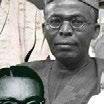





Page N600, 000

000
Double Spread Half Page N1, 200, 000
10X6 N700, 000
10X5 N650, 000
10X4 N600, 000
10X3 N500, 000
9X6 N440, 000
9X5 N395, 000
9X4 N335, 000
9X3 N310, 000

8X6 N410, 000

8X5 N380, 000
7X5 N320, 000



7X4 N315, 000

6X5 N280, 000

6X3 N145, 000
6X2 N85, 000
5X2 N70, 000
4X4 N160, 000
4X3 N95, 000
4X2 N65, 000
3X3 N60, 000
3X2 N50, 000
2X2 N30, 000
2X1 N15, 000 1X1 N7, 000










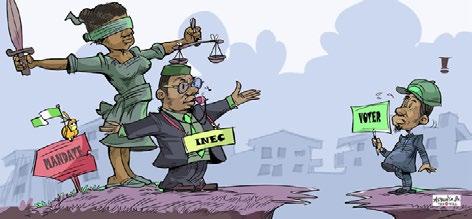













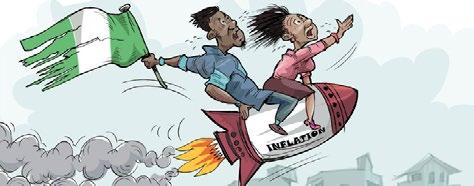
























The recent peace deal between the Katsina State Government and wanted bandits reeks of weakness and powerlessness on the part of the state government and helplessness on the part of the community. Before the negotiations got underway, Governor Dikko Radda had given his approval.
Speaking at the launch of an EU-funded conflict prevention project earlier, the governor disclosed that negotiations were ongoing in several frontline local government areas and credited them with restoring calm in those areas. But the ongoing negotiation that drew public attention and underlined the method, processes and severity of the situation was last Sunday’s talks between communities in the Faskari Local Government Area of the state and bandits declared wanted by the Nigerian State.
Some of the wanted bandits were present during Sunday's negotiations. They included Ado Alerio, said to be one of the most notorious bandits in the Northwest, Isiya Kwashe Garwa, a wanted bandit declared wanted by the Defence Headquarters, Babaro, accused of killing 32 worshippers in a mosque in Katsina and Malam Hassan Dan Tawawe, another notorious bandit.
At the end of the meeting, the bandits who came armed to the meeting, got what they wanted. In exchange for an agreement to stop attacks on villages, ensure safe passage for farmers and release kidnapped persons in their custody, the bandits demanded freedom of movement and access to markets for the Fulani, as well as the development of their areas.
“In Nigeria, whenever there is a discussion,

Why the Katsina State Government would embark on a similar venture that appears certain to collapse and lead to renewed violence, speaks volumes about the current state of the nation State in which the constitutional mandate to secure and protect the citizenry has weakened and need to be revived urgently “
NIGERIA BUREAU: 36AA Remi Fani-Kayode Avenue, GRA, Ikeja. Lagos, Nigeria.
810 345 2286, +234 913 333 3888
they call Fulani herders bandits and terrorists. But tell me, which tribe in the world does not have criminals among them?” Mr Garwa reportedly addressed the gathering in Hausa. He was said to have vowed that killings and kidnappings would continue until “injustice” against the Fulani was addressed. “There will be no peace if security agencies do not also stop killing our people,” he said. Similar negotiations are also ongoing between local community leaders in Dan Musa, Jibiya, Batsari, Kankara, Kurfi and Musawa Local Government Areas.
This is worrisome. Radda’s successor, Aminu Bello Masari, embarked on a similar negotiation during his tenure and failed. He lived to regret even entering a negotiation with bandits, persons who kill at will, live by no moral code and lack any form of integrity to speak of.
In a well-advertised negotiation with terrorists in 2021, Masari celebrated the handover of weapons by the terrorists, paid a large sum of money to the criminals and later regretted his decision. Recall that Governor Masara acted with the support of the country’s security networks.
Apart from the Secretary to the state government, police commissioner and Director-General of the SSS, who were actively involved in the negotiation, the Security Chiefs at the defence headquarters, with whom the governor and his team held a meeting, sanctioned the talks. According to ex-Governor Masari, a dialogue with Fulani leaders and the vigilante across the eight LGAs ensued and led to an agreement that was signed at Kankara in the presence of all our traditional leaders, including the late

PUBLISHER/EDITOR-IN-CHIEF –




BY ADEWOLE KEHINDE
If we want to boost border security, we have to help law enforcement agencies beef up their resources to meet this demand. We cannot have one without the other." -
Henry Cuellar
On Thursday, September 11, 2025, at the Force Headquarters in Abuja, the Inspector-General of Police, IGP Kayode Adeolu Egbetokun, hosted a landmark conference with commanders of all border patrol units across the country. This gathering was not just another meeting; it was a timely intervention and a moment to renew the Nigeria Police Force’s shared commitment to the sacred task of defending our nation’s borders and protecting Nigerians from threats that exploit our weaknesses.
There is no doubt that the porosity of our borders has long been a national vulnerability. We have witnessed the inflow of small arms and light weapons fueling violence in villages and cities. Contraband goods continue to sneak in, crippling our local industries and weakening economic resilience. Vulnerable women and children have been trafficked across borders by ruthless syndicates.
Terrorists and criminal groups have taken advantage of these loopholes to infiltrate and destabilise communities. These realities make the IGP’s conference not only timely but necessary. It is encouraging to note the recent successes of our security agencies in responding to these challenges. Only recently, the interception of a shipping container from Turkey carrying over 800 rifles and 100,000 rounds of ammunition, concealed among furniture, was a remarkable feat. This operation exposed the scale of the threats we face and, at the same time, highlighted the capacity of our security architecture when vigilance and collaboration are applied. Such achievements deserve commendation. Particular praise must go to the officers of the Border Patrol Section. They bear an enormous responsibility not just of policing boundaries,
but of shaping the very future of Nigeria. Each interception, each prevented infiltration, is an act of service that protects lives, secures livelihoods and strengthens national stability.
However, success cannot be sustained without adequate support. I, therefore, call on the Federal Government to provide the Nigeria Police Force with sufficient funding to embrace technology in border management.
Surveillance systems, drones, biometric scanners, and real-time data analysis tools are no longer luxuries; they are necessities in the fight against insecurity. With these tools, the goal of policing will not be to wait for crime to occur, but to prevent it, disrupt it, and dismantle it before it matures.
Beyond funding, seamless collaboration is essential. Border security cannot be handled in isolation. The Police must work hand in hand with the Nigeria Customs Service, the Nigeria Immigration Service, the Armed Forces, and other stakeholders. Intelligence-sharing, joint operations and coordinated responses are the only way to ensure that no weak link undermines the entire chain of security.
EACH INTERCEPTION, EACH PREVENTED INFILTRATION, IS AN ACT OF SERVICE THAT PROTECTS LIVES, SECURES LIVELIHOODS AND STRENGTHENS NATIONAL STABILITY
IGP Egbetokun’s vision, reflected in this conference, is one that deserves commendation. It signals that the Nigeria Police Force understands the magnitude of the challenges at our borders and is willing to confront them with renewed vigour and purpose. Now, it is up to the government, relevant agencies, and indeed all Nigerians to support this effort.
Nigeria’s future depends on secure borders. With leadership, technology, and collaboration, we can close the gaps, safeguard our communities, and strengthen the sovereignty of our nation.
BY ALHAZAN RILWAN
Each academic session, parents are compelled to buy new sets of textbooks for their children, even when the differences between the new editions and the old ones are negligible.
This practice has placed an enormous financial strain on families, especially low- and middle-income households. A single textbook can cost between N5,000 and N15,000, and when multiplied across several subjects, the costs quickly become overwhelming.
In many cases, parents are forced to choose between meeting basic needs and providing essential learning materials for their children.
While schools may justify these frequent changes as efforts to align with new standards or improve curricula, the reality is that the practice does not always result in better educational outcomes. Instead, it undermines sustainability, wastes resources, and raises questions of transparency. Too often, old but usable editions are discarded, and in some cases, the changes appear to be driven more by profit motives than genuine academic necessity.
Fortunately, other states have taken bold steps to address this challenge, and Oyo can learn from them. Imo State, for example, has outlawed annual textbook replacements, mandating their use for at least four years in both public and private schools.
Edo State enforces a minimum four-year cycle, while Ogun State goes further by mandating a six-year usage period with penalties for schools that fail to comply.
Enugu State approves textbooks for three years before review and Benue State has abolished customised, non-transferable books to encourage handovers from seniors

to juniors.
These policies have reduced parental burdens, improved resource efficiency, and enhanced learning consistency.
Oyo State should not lag behind. To tackle this issue effectively, I propose the following measures:
Standardize Textbook Usage: Enforce a policy requiring textbooks to be used for at least 3–5 years unless major curriculum changes justify new editions. Strengthen Oversight: Empower the Ministry of Education to monitor compliance and check cases where changes appear commercially motivated.
Promote Reuse and Affordability: Encourage recycling programs, textbook sharing, and provide subsidies or free books for indigent students.
Engage Stakeholders: Involve parents, teachers, and education experts in reviewing textbook policies to ensure they genuinely serve student interests.
By taking these steps, the Oyo State Government can ease the financial burden on families, ensure equitable access to education, and foster a more sustainable learning environment, just as several other states have successfully done.
A SINGLE TEXTBOOK CAN COST BETWEEN N5,000 AND N15,000 AND WHEN MULTIPLIED ACROSS SEVERAL SUBJECTS, THE COSTS QUICKLY BECOME OVERWHELMING
I urge policymakers to act without delay to regulate textbook changes and protect the interests of both students and parents.
Thank you for the opportunity to raise this critical issue. I hope this sparks meaningful discussions and decisive action.
•Alhazan Rilwan is the Deputy Director, Information Archives, Oyo State Ministry of Information, Ibadan.



Continues from page 34
The government’s gradual easing of foreign exchange restrictions and efforts to stabilize the naira in 2025 played a pivotal role in reducing International Breweries’ realized forex losses from a staggering 47.7 percent of revenue in 2024 to a negligible 0.0012 percent in 2025. Unrealized forex losses similarly fell

(+11.70%)
• Chellaram Plc: ₦13.30 → ₦14.60 (+9.77%)
• 41 equities declined, higher than 22 in the previous week.

Nigeria’s macroeconomic environment was characterized by high inflation and currency volatility in 2024, which heavily impacted consumer spending
The company’s finance cost ratio — interest expenses as a percentage of revenue — dramatically improved from 14.94 percent in 2024 to 1.14 percent in 2025, reflecting lower borrowing costs and better capital structure management amid a recovering economy. Currency stabilisation efforts and easing inflation helped International Breweries regain footing reflected in the net profit margin swing from negative 47.85 percent in 2024 to a positive 12.11 percent in 2025.
International Breweries’ internal turnaround is marked by rigorous cost control and forex risk management. Profit before tax rebounded from a loss of N150.23 billion in HY 2024 to a profit of N61.53 billion in HY 2025. Profit after tax moved from a significant loss of N106.78 billion to a net profit of N41.29 billion.
The company’s operating profit margin surged from a loss position of 32 percent to nearly 34 percent, signaling a return to operational excellence. Finance costs shrank both in absolute terms and as a ratio of revenue, while other expenses plummeted from 60.05
Management credits these gains to improved production efficiencies, tighter expense management, and proactive forex risk mitigation strategies that slashed total forex losses from over 63 percent of revenue in 2024 to virtually zero in 2025.
The company’s ownership remains highly concentrated, with AB InBev holding 161,580,471,272 shares out of a total of 168,291,591,406. Expressed as a ratio, this is 24:25, meaning AB InBev controls nearly all of the company. Brauhaase holds 2,377,579,013 shares, roughly 1:71, while other minority shareholders share the remaining 1:39. This concentration suggests that major decisions are guided by the parent company, providing stability, while dividends are distributed based on the proportion of shares held.
Operational efficiency has improved significantly. The company’s cost-to-income ratio fell from 25:100 in the first half of 2024 to 17:100 in 2025. In simple terms, the company now spends 17 naira to earn 100 naira in revenue, compared to 25 naira last year. This drop reflects better management of operating expenses and stronger profitability, which could enhance the company’s ability to pay dividends to shareholders. Liquidity has also strengthened. The ratio of current assets to current liabilities improved from 119:100 in 2024 to 31:20 in 2025. Current liabilities, also called short-term obligations, are debts and commitments the company must pay within one year. For International Breweries, these include money owed to suppliers, short-term loans, salaries and taxes owed, the portion of long-term debt due within the year, and other similar obligations. The improvement shows that the company now has 31 naira in short-term assets for every 20 naira of obligations, up from 119 naira for every 100 naira last year. This indicates the company is better positioned to meet its short-term obligations, reducing financial risk and supporting consistent dividend payments.
Overall, International Breweries appears more efficient, financially stable, and well-positioned to sustain dividends. Investors can take confidence from the company’s improved performance and stronger financial ratios, even as ownership remains largely concentrated.
Notable losers included:
• Omatek Ventures Plc: ₦1.32 → ₦1.08 (-18.18%)
• Cornerstone Insurance Plc: ₦7.33 → ₦6.20 (-15.42%)
• Secure Electronic Technology Plc: ₦0.86 → ₦0.75 (-12.79%)
• Royal Exchange Plc: ₦2.30 → ₦2.04 (-11.30%)
• UBA Plc: ₦48.70 → ₦44.02 (-9.24%)
66 equities prices remained unchanged in comparison to 55 in the previous week.
Index Performance
All sectoral indices finished higher except for:
• NGX CG (-1.04%)
• NGX Premium (-1.14%)
• NGX Banking (-2.57%)
• NGX Pension (-0.15%)
• NGX Insurance (-4.67%)
• NGX AFR Bank Value (-3.66%)
• NGX AFR Div Yield (-1.74%)
• NGX MERI Growth (-0.80%)
• NGX MERI Value (-3.73%)
The NGX ASEM Index closed flat.
Bonds Market
A total of 44,730 units valued at ₦46.727 million were traded this week in 41 deals, compared to 24,228 units valued at ₦22.236 million in 34 deals last week.
Overall, the market closed the week on a mildly positive note, with the All-Share Index and Market Capitalization both advancing by 0.92%.
The growth was largely fostered by renewed investor interest in select large-cap and fundamentally strong stocks, as well as price appreciation in key gainers such as Guinness Nig. Plc, Multiverse Mining & Exploration Plc, and Eunisell Interlinked Plc. These movements provided enough momentum to lift the headline indices despite a slowdown in overall market activity.
However, turnover volume and value declined compared to the previous week, and market breadth weakened as more equities recorded losses than gains. This mixed sentiment suggests that while investor appetite for opportunities in resilient sectors and undervalued stocks supported the week’s positive close, caution still prevailed across the broader market.
productivity by lowering operational costs for farmers, increasing yields, raising incomes, and improving rural livelihoods.
Speaking on the development, the Executive Vice Chairman/Chief Executive Officer of NASENI, Mr. Khalil Suleiman Halilu, commended NEC’s resolution;
struggled with the high cost of irrigation,
“NEC’s decision is a strong vote of confidence in our ability to deliver energy-efficient, homegrown solutions that will boost food production, lower costs for farmers, and secure livelihoods. Special appreciation to President Bola Ahmed Tinubu for the continuous support, ensuring NASENI remains at the forefront of advancing his administration’s reforms on industrialization, technology transfer, and food security. Together, we are building a more resilient agricultural sector, harvesting more sustainably and unlocking infinite possibilities for Nigeria.”
To facilitate immediate mass production and distribution of the pumps, NEC
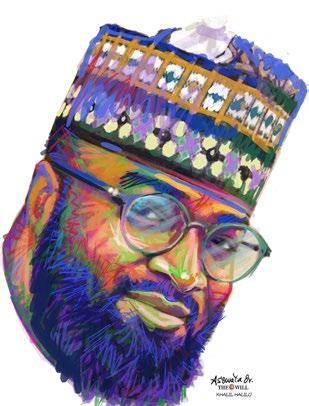
further mandated the Honourable Minister of Budget and Economic Planning, Senator Abubakar Atiku Bagudu, to work out funding modalities for NASENI.
This endorsement reinforces NASENI’s role as a key driver of President Tinubu’s #RenewedHope Agenda, particularly in advancing industrialization, local technology transfer, and sustainable solutions for national prosperity.
THEWILL recalls that NASENI and the Presidential Implementation Committee on Technology Transfer (PICTT) recently launched the second phase of the DELTA-2 Programmethe 2nd Call for Proposals, which will focus on Commercialization of all R&D outcomes in different fields of the economy.
The Delta-2 Project is a bilateral collaboration by the Federal Government of Nigeria through NASENI-PICTT and the Czech Republic through the Technology Agency of the Czech Republic (TA CR).
The scheme targets submissions from innovators, technology entrepreneurs and researchers in Nigeria across mining, agriculture, advanced manufacturing, science and engineering, and the others.
The 1st Call for Proposals under the Delta-2 programme was launched in the year 2022, following which grants were disbursed by NASENI to winners of the approved projects to scale up their enterprises.

“Power gaps are inevitable. But relationships built across them, deliberately, ethically, and with humility, can change systems.” – Unknown
THE UNEVEN TERRAIN OF INFLUENCE
In Nigeria, as across much of Africa, access, voice, and influence are rarely distributed evenly. Whether in government, philanthropy, civil society, or the private sector, certain individuals and institutions wield disproportionate power. And yet, progress, social, economic, or political, requires collaboration across these gaps.
But how do you build genuine relationships when one party has more resources, status, or control over decision-making? How do you build trust when there is a history of exclusion, marginalisation, or manipulation?
This is the central challenge of relational work across power asymmetries. It is one of the most important dynamics I have come to understand in modern leadership, governance, advocacy, and development.
UNPACKING POWER ASYMMETRY
Power asymmetries exist when one actor or group has greater access to resources, authority, legitimacy, or voice than another in a shared relationship or system.
This can show up in various forms:
• Government vs. citizens
• Donors vs. grantees
• Urban-based NGOs vs. rural communities
• Senior policymakers vs. junior advisors

• Traditional institutions vs. youth-led groups
Power itself is not inherently negative. The problem arises when power distances are left unacknowledged or unmanaged, making mutual trust, collaboration, and accountability nearly impossible.
WHY THIS MATTERS IN THE AFRICAN CONTEXT
Power asymmetries are historically, politically, and socially embedded in many African countries, including Nigeria. Colonial legacies, military rule, donor dependency, ethnic hierarchies, and elite capture have all shaped systems where those who speak and those who decide are often disconnected.
Efforts to drive change, whether through public policy, advocacy, development programs, or social entrepreneurship, often fail because they do not address the relational dynamics that underpin these divides.
"You can’t collaborate meaningfully if the relationship is built on silent coercion."
– Unknown
Building bridges across power gaps is essential to achieve:
• Equitable development outcomes
• Inclusive governance
• Authentic community engagement
• Trust-based funding and philanthropy
• Sustainable reform coalitions
TYPICAL FORMS OF RELATIONAL POWER GAPS (WITH AFRICAN EXAMPLES)
1. Donor–Recipient Dynamics
In many African countries, development is heavily donorfunded. As someone who works in the development space, I have witnessed imbalances in agenda-setting, timelines, and definitions of success.
Example: International NGOs in Northern Nigeria
In Borno and Yobe States, during the height of the Boko Haram crisis, INGO-led programs often set humanitarian priorities without full participation from local communities or government officials. Many local organisations were treated as subcontractors, not equal partners.
Today, localisation efforts have improved that dynamic, but much work remains to centre local knowledge and autonomy in donorfunded programs.
2. Government–Community Relations
Citizens often see public institutions as distant or unaccountable. Government officials, in turn, often view community input as noise or a threat.
Example: Lagos Urban Transport Reform
When Lagos State began restructuring its informal transport sector to introduce BRT lanes and reduce danfo buses, union leaders, riders, and drivers felt shut out of early planning. Protests followed, not because people rejected reform, but because they were not part of its design.
Eventually, it turned out to be one of the most impactful reforms in the state. However, prior power gaps in consultation created resistance that could have been avoided with relational investment.
3. Elites and the Informal Sector
In many African cities, informal workers: traders, artisans, transport workers, and street hawkers, form the backbone of the economy. Yet they are often spoken about, not spoken with.
Example: Market Modernisation in African Cities Government-led efforts to modernise open-air markets often lead to displacement and marginalisation, especially for women traders. Relationships between market associations and municipal authorities are often marked by mistrust and asymmetry, where dialogue is extractive rather than empowering.
4. Youth–Institutional Engagement
With Africa’s youth population rapidly growing, intergenerational engagement is more important than ever. But power asymmetries here are both cultural and structural. Older leaders hold resources, connections, and platforms. Youth are expected to ‘wait their turn.’
Example: The African Union’s Youth Engagement Strategy
While AU policy has opened new spaces for youth advisors, many young advocates report being treated as symbolic representatives without real influence. Even when invited, youth often lack the relational power to shape agendas or policies.
THE FRAGILITY OF POWER-ASYMMETRIC RELATIONSHIPS
When power asymmetries are not addressed, relational dynamics become fragile. You often encounter:
• Performative Participation: Inviting ‘partners’ to meetings but not to decision-making tables
• Token Inclusion: Adding a youth or woman to a panel to ‘tick the box’ without giving them meaningful agency
• Intellectual Dismissal: Assuming elite actors have more knowledge, even when they are less proximate to the problem
Power asymmetries are historically, politically, and socially embedded in many African countries, including Nigeria. Colonial legacies, military rule, donor dependency, ethnic hierarchies, and elite capture have all shaped systems where those who speak and those who decide are often disconnected
• Emotional Disconnect: Powerful actors remain insulated from the consequences of their decisions on the less powerful
These dynamics do not just hurt feelings. They break systems. The goal is not to erase power differences, because they often cannot be, but to acknowledge them honestly and design relational practices that build trust, transparency, and shared purpose.

RELATIONAL REPAIR: HOW TO WORK THROUGH POWER GAPS
1. Name the Asymmetry
Do not pretend everyone is equal when they are not. Acknowledge the gap with humility: “We know we hold more resources, but we want to work in a way that balances this dynamic.” Naming the asymmetry allows both sides to build trust from a place of honesty, not denial.
2. Design for Listening, Not Just Reporting
Create spaces where less powerful actors can speak freely, without surveillance, pressure, or preconditions. Use methods like: Anonymous storytelling, Community-led town halls, Translation and language inclusion or One-on-one ‘quiet interviews.’
Example: UNICEF Nigeria’s U-Report allows young people to anonymously share views via SMS, removing some barriers of formality and fear. It is one step toward asymmetric listening.
3. Practice Relational Transparency
It is not enough to publish reports. Be open about:
• How decisions were made
• What feedback was used
• Where compromises happened
• What power dynamics shaped the outcome
Relational transparency is different from procedural compliance. It says: “We owe you honesty about the process, not just the result.”
A MORE HONEST TABLE
To build policy, social progress, or development that lasts, we must build relationships that are honest about power, generous with trust, and rooted in shared accountability.
Power will always exist, but it does not have to dictate the tone of the relationship. It can be acknowledged, redistributed, and softened through care, humility, and design.
Because in the end, the strength of any system is measured not by how loudly the most powerful speak, but by how clearly the least heard are finally listened to.
Aramide Abe is a networking expert and a professional in international development. She is the convener of an African business leader network - Naija Startups. Follow arams on Twitter, Website - www.aramide.ng





BY NIKOLA MIKOVIC
As the European Union continues to seek alternatives to Russian , Nigeria cogasuld position itself at the centre of new transcontinental energy corridors connecting Africa to Europe. The resourcerich nation has the capacity to help European countries diversify their natural gas supply mix, which is why its strategic importance in the global energy landscape is expected to grow.
The war in Ukraine has led to what is widely regarded as Europe’s “energy divorce” from Russia. As a result, the EU – once heavily dependent on Russian gas – has turned to the United States for liquefied natural gas (LNG), while Moscow has redirected its energy flows eastward.
The problem, however, is that 51 billion cubic metres (bcm) of LNG Europe imported from the US in 2024 cannot compensate for 155 bcm of natural gas the EU was purchasing from Russia before the Ukraine conflict. Although Nigeria is prepared to increase its LNG exports to Europe, this alone will still fall short of bridging the supply gap.
The global energy market is constantly changing, driven by various regional priorities and shifts in supply and demand, as well as geopolitical factors. To address its complex energy challenges, Europe needs both LNG and pipeline natural gas.
Fully aware of this, European leaders see the Trans-Saharan Gas Pipeline (TSGP) –planned to run from Nigeria’s Warri region, through Niger, to Hassi R’Mel in Algeria, and further to Europe – as a potential long-term solution.
From the European perspective, increasing LNG imports from Nigeria, while encouraging regional actors to move forward with the construction of the 4,128-kilometre (2,565-mile) Trans-Saharan Gas Pipeline, represents a strategic step toward enhancing energy security. The project is widely seen in the broader context of Europe’s desire for diversified energy supplies, especially in view of supply challenges following global the war in Ukraine
Key actors involved in this initiative –Nigeria’s National Petroleum Corporation (NNPC), Algeria’s Sonatrach, and the Italian engineering firm Ansaldo Energia – expect the TSGP (also known as the Trans-African gas pipeline) to begin to become operational around 2030. To achieve this ambitious goal, they will have to invest $13 billion in its construction.
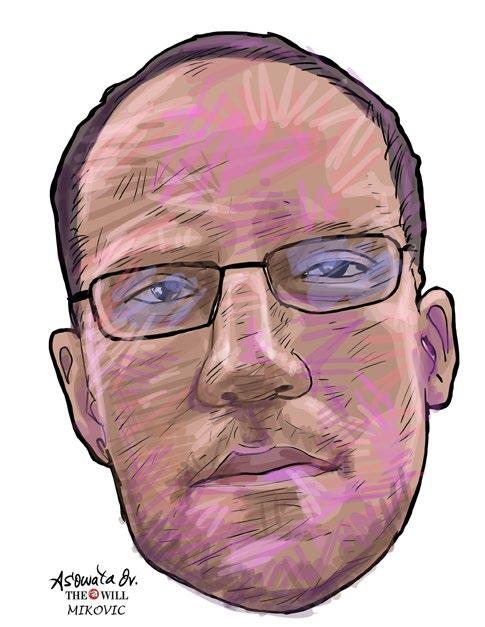
The fact that, in February, Nigeria, Algeria, and Niger signed key agreements to advance the Trans-Saharan Gas Pipeline suggests that African nations see the project as one of their top energy priorities. However, the TSGP is designed to transport “only” 30 billion cubic metres of natural gas per year, which is unlikely to satisfy Europe’s needs.
That is why European nations are counting on another large-scale project – the Nigeria-Morocco Gas Pipeline (NMGP). It would run from Nigeria, through multiple West African coastal countries (Benin, Togo, Ghana, Côte d’Ivoire, Liberia, Sierra Leone, Guinea, Guinea-Bissau, Gambia, Senegal, and Mauritania), to Morocco, and then onwards to Europe. The NMGP would be an extension of the existing West African Gas Pipeline, connecting Nigeria with Benin, Togo, and Ghana.
Although Morocco reportedly began construction on its section of the pipeline in August, it remains unclear when the project will be completed. More optimistic sources suggest the pipeline could be operational as early as 2029, while other reports indicate it may not be completed before 2046. One thing is for sure: upon completion, it will be the world’s longest offshore pipeline and the second-longest pipeline overall.
The project, also known as the African Atlantic Gas Pipeline (AAGP), is jointly led by Morocco’s National Office of Hydrocarbons and Mines (ONHYM) and the Nigerian National Petroleum Company Limited (NNPCL). The pipeline is expected to
transport 30 billion cubic metres of natural gas per year, which, combined with another 30 billion cubic metres from the TransSaharan Gas Pipeline, could help partially address Europe’s energy shortages.
The challenge, however, lies in the competition between the two projects, which raises questions about which will receive priority funding. Still, given that the United Arab Emirates, China, and the United States showed interest in investing in the NigeriaMorocco Gas Pipeline, it is now seen as more likely to move ahead first.
In the long term, both projects may provide Europe with new access to Africa’s gas reserves, helping to cut its dependence on traditional suppliers. In this geopolitical game, Nigeria – an OPEC member with the largest gas reserves in Africa and the seventhlargest in the world – plays a crucial role.
It is, therefore, unsurprising that this year ADIPEC, the world’s largest energy event, being held this year with a special focus on building energy resilience to support inclusive global progress, will feature several Nigerian energy ministers and company CEOs within its conference lineup of global energy leaders.
With more than 200 trillion cubic feet of proven gas reserves, the country is positioning itself as a key energy partner not only for Africa but also for Europe and other global markets seeking to diversify their energy sources.
But given that much of Nigeria’s reserves remain untapped due to infrastructure deficits and underinvestment in the sector, serious obstacles remain before Africa’s most populous nation can fully capitalise on its energy potential and meet growing international demand.
•Mikovic is a business and economy analyst.
With more than 200 trillion cubic feet of proven gas reserves, the country is positioning itself as a key energy partner not only for Africa but also for Europe and other global markets seeking to diversify their energy sources

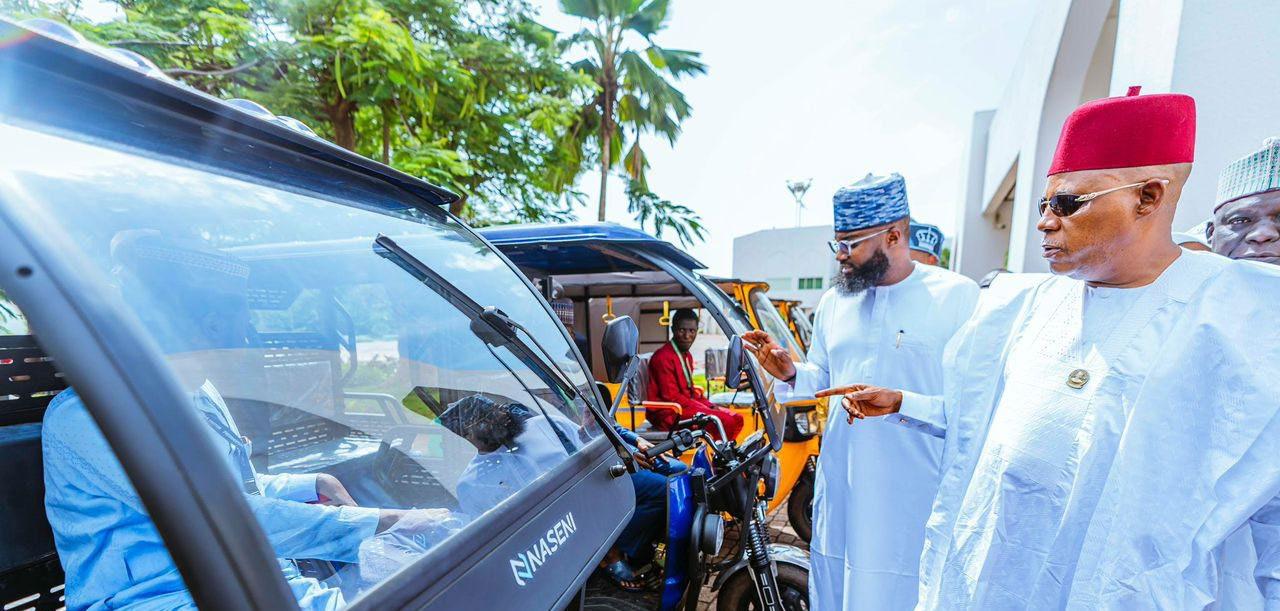
is timely and vital for Nigeria’s sustainable development."
David-West affirmed that the strategic vision at LBS aligns closely with advancing digital transformation and promoting financial inclusion, aiming to develop the leaders needed to navigate and drive this emerging landscape.
Nigeria’s digital economy is undergoing remarkable growth, energised by a young and dynamic population alongside rapid

digital adoption. According to the Nigerian Communications Commission’s 2024 report, internet penetration has reached 43.5 per cent, with over 163 million Nigerians online as of March 2024. The telecommunications sector contributes around 18 to 20 per cent to Nigeria’s GDP, highlighting the vital role of information and communication technology
David-West pointed out that "this digital revolution transcends statistics; it reshapes commerce, services, and livelihoods. Our burgeoning e-commerce market, projected to exceed $16 billion by 2030, is fuelled by trailblazing platforms like
"Innovative logistics startups such as Kwik and GIGL illustrate how digital technologies spawn entirely new value chains, enhancing efficiencies and expanding economic opportunities. Such developments promise exponential employment gains, diversification away from oil dependence, and transformative service delivery across sectors."
She explained that "the Nigerian financial sector is both a driver and beneficiary of the digital revolution. In 2024, Nigeria’s fintech ecosystem attracted over $2 billion in investments, sustaining its position as the continent's financial technology powerhouse. This capital influx is propelling groundbreaking innovations that redefine financial transactions and inclusion."
She also said, leading Nigerian banks, including Access Bank
and GTBank, harness cutting-edge technologies like Artificial Intelligence (AI) and Machine Learning (ML) to enhance fraud detection, personalise services, optimise credit scoring, and deploy AI-enhanced customer support.
She noted that "in addressing taxation within the digital economy, there are both challenges and substantial opportunities for revenue generation. Since January 2022, Nigeria has implemented a six per cent Digital Services Tax (DST) on non-resident digital service providers, complementing existing VAT on foreign digital services and capitalising on the expanding digital marketplace."
She cited an example of this initiative is the electronic money transfer levy, which imposes a N50 fee on recipients of bank transfers of N10,000 and above, serving as a valuable revenue stream in Nigeria’s evolving digital payments landscape. David-West highlighted how digital payments and mobile money services can serve as a foundation for formalising vast informal sectors, enhancing tax compliance, and integrating businesses into formal financial systems.
Looking ahead, she noted that "the interconnection of digital transformation across banking, finance, and taxation is a powerful catalyst for Nigeria’s economic growth. Seamless digital payment systems facilitate efficient tax collection, broaden financial inclusion, and provide critical data for evidence-based policy-making and enforcement."
The Federal Government plans to issue a N758bn bond before the first week of October to clear outstanding pension liabilities, the National Pension Commission has disclosed.
This was disclosed at a press briefing in Abuja by the Director of Contribution and Bond Redemption Department at PenCom, Usman Musa.

Musa who explained that the process had already begun added that it was moving quickly following the approvals of the Federal Executive Council and the National Assembly.
His words, “As the DG has mentioned, the process of issuance of the N758bn bond has commenced. In fact, we have gone very fast.
“We are hopeful that by the end of this month, or at least the first week of October, we will start receiving the process. And once that is done, the bond is ready to go; we will commence payment.”
In her address, the Director-General of PenCom, Omolola Oloworaran, said the inauguration of the Pension Industry Leadership Council marked a “historic milestone” for the pensions industry.
According to her, the council was designed to provide collective leadership and coordination, similar to the Bankers’ Committee in the financial system.
Her words, “Since 2004, the Contributory Pension Scheme has mobilised long-term savings, restored retirement dignity and bolstered financial stability. But

that said, there are still urgent challenges. This includes coverage gaps, adequacy, governance and impact. We must demonstrate impact, and we need to do a whole lot more of that.”
She stressed that the mandate of the new council was clear, listing its tasks as expanding coverage, especially to the informal sector, enforcing governance and fiduciary standards, channelling assets into national development while safeguarding contributors’ interests, driving innovation in products and processes, and strengthening public confidence.
PenCom has intensified the digitization of its processes towards consolidating its global spotlight which has earned it international recognition.







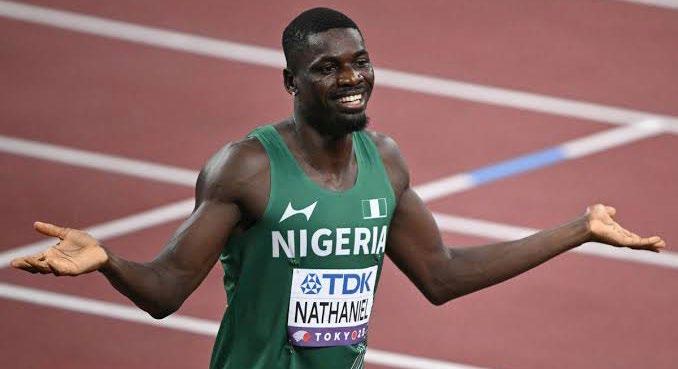
BY JUDE OBAFEMI
The 2025 World Athletics Championships in Tokyo, which held between September 13 and 21, offered Nigeria both vindication and exposure of faults. About 15 athletes represented the country. One silver medal came through Tobi Amusan in the women’s 100m hurdles. Other performances included Kanyinsola Ajayi reaching the men’s 100m final (finishing sixth), Ezekiel Nathaniel placing fourth in the 400m hurdles and Chukwuebuka Enekwechi finishing fifth in the shot put. These results confirm that Nigerian athletes remain competitive on the world stage, but they also underline how non-performance issues, such as logistics, governance and preparation are costing potential.
Tobi Amusan’s silver in the 100m hurdles stood out. She ran 12.53 seconds in the heats and 12.36 in the semifinal, before clocking 12.29 in the final. Her trajectory at this championship carried weight because she is a world record holder, and because she had spoken openly about challenges off the track, including what she described as inadequate equipment and treatment by the federation.
Her comments went viral, especially her criticism about receiving kits in small nylon bags and not having all the items she expected, such as proper shoes, despite supplying her size. She compared Nigeria unfavourably with other countries whose athletes arrived with more formal packing, like suitcases.
The Athletics Federation of Nigeria responded with denials. President Tonobok Okowa said that the kits were provided in batches, and that Amusan had displayed only the first packet rather than the full set. He maintained that essentials, spikes, shoes, uniforms, were delivered, but acknowledged that one item (a travel bag) was missing because the World Athletics organisation had provided it. Okowa also said Amusan was flown business class to Tokyo after she requested an upgrade. Other federation officials said that the sponsor, HiRacer Running, had arranged the kits and that the arrangement (including packaging) was similar for other countries under the same sponsorship.

Beyond Amusan’s situation, Nigeria’s absence from all relay events was a conspicuous failure. The country missed the qualifying path because its teams did not take part in the World Relays in Guangzhou, China, following visa issues and administrative lapses. Without that qualification, Nigeria could not enter relay teams in Tokyo. This is especially significant given that relays have often served as chances to win medals or gain experience, even when individual events fall short.
The men’s 100m field saw Kanyinsola Ajayi produce a major result. He ran 9.88 seconds in the heats, 9.93 in the semi-final, then 10.00 in the final to finish sixth. That marks the first time in nearly 20 years a Nigerian male sprinter has made the 100m final at the World Championships. Ezekiel Nathaniel also came fourth in the men’s 400m hurdles, and Enekwechi’s 21.52m in shot put
placed him fifth among elite throwers. Among the women, aside from Amusan, there were less successful efforts in field events: Ese Brume did not advance beyond long jump qualification, and others like Prestina Ochonogor, Chioma Onyekwere-Lyons, and Oyesade Olatoye failed to reach finals in their respective throws. Nigeria won one medal overall, Amusan's silver. There was neither gold nor bronze.
Several lessons emerge from this. Firstly, performance depends on more than raw talent. Preparation logistics, appropriate equipment, and clear communication matter as much as physical training. When athletes feel under-supported, morale is affected. Amusan’s complaint struck a chord because it reflected what many believe are recurring problems. The fact that the federation responded defensively suggests that systemic issues have not surfaced in full. Secondly, absence from relay events shows that administrative failure has a competitive cost. Relay medals and framing as a team contribute to national standing. When these are lost because of paperwork or visa issues, the damage is beyond lost medals. It also affects athletes’ development, especially younger or less experienced ones who rely on relay exposure.
Thirdly, the need for transparency in kit supply and travel arrangements is urgent. Full disclosure of what was contracted with sponsors, schedule of deliveries, what items were included, how they were distributed, all these must be standard practice. If items are sent in batches, athletes should know in advance which items will arrive when. The travel upgrades, like the business class flight arrangements for Amusan, may matter less to many if they believe essential gear was delayed or missing. Fourthly, selection and registration must be done with enough lead time. Athletes should not find themselves unable to compete in relays or missing out on qualification because of last-minute administrative disruptions. Otherwise, another Favour Ofili will switch national allegiances to compete for a country with far better athlete welfare.
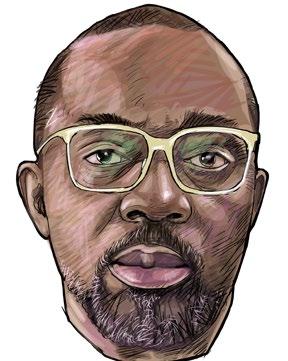
The recent decision of the UK First-Tier Tribunal in Tali Shani v Chief Mike Agbedor Abu Ozekhome [2025] UKFTT 1090 (PC) has thrown Nigeria’s legal community into a deep reflection. At first glance, it appeared to be a straightforward dispute over a London house. Yet the judgment quickly escalated into a serious inquiry about credibility, forged documents and the involvement of a Senior Advocate of Nigeria (SAN). For many lawyers, students and members of the public, the outcome is not only a legal setback but also it shows how fragile professional integrity has become.
The property in question is a modest but valuable home at 79 Randall Avenue, Neasden, in North London. Records show it was registered in 1993 in the name of “Tali Shani.” In 2021, Chief Mike Ozekhome, one of Nigeria’s most visible SANs, applied to have the house transferred to his name. That application was challenged by a female claiming to be Ms. Tali Shani, who insisted that she remained the rightful owner and had never authorised such a transfer.
As the case progressed, retired General Jeremiah Useni, a former military administrator of the defunct Bendel State, who had also served as Minister of the FCT during the military era, appeared as a key figure. Useni, who died in January 2025, told the tribunal in evidence before his death that he had personally purchased the property in 1993 with his own funds. He admitted that the registration was not in his name but in “Tali Shani,” whom he said he did not know at that time. This unusual arrangement set the stage for what Judge Ewan Paton later described as a web of contradictions and implausible claims. From all we know, It appeared Useni bought the property with funds illicitly acquired while in public service and intended to hide it by registering it in a fictitious name.
The tribunal paid close attention to the evidence produced by the party claiming to be Ms. Shani. Passports, a Nigerian National Identity Number slip, a Power of Attorney and a death certificate were filed. These documents did not withstand scrutiny. Judge Paton found them riddled with inconsistencies, some appearing to be forged or fraudulently acquired.
A man identified as Mr. Tali Shani also gave evidence, stating that he was born in Plateau State in 1973 and had been the one that bought the London house at the age of 20. He claimed that his funds came from farming and cattle trading. The judge rejected this as implausible,
pointing out the absence of supporting financial records and the improbability of such a purchase by someone of his age and background in 1993.
The tribunal concluded that “Tali Shani” was most likely a fictitious name, created to mask the real ownership of the property. While Useni admitted to purchasing the house and using a code name, the use of a false identity meant that no clean chain of title could be established. As a result, neither Ozekhome nor the Shani claimants were recognised as the rightful owner.
It is the involvement of a SAN that has caused such embarrassment.
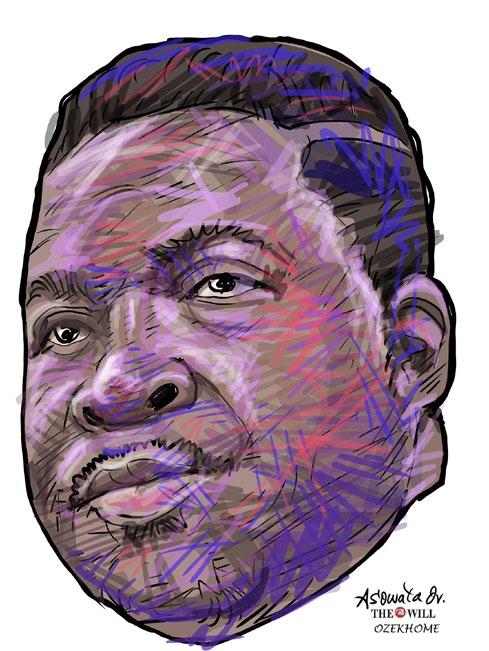
The rank of Senior Advocate is meant to be the pinnacle of legal achievement in Nigeria. It is conferred on a select few who demonstrate exceptional skill and integrity. Yet here, a SAN was tied to a case where the central documents were found to be fabricated and the claimant’s very existence was doubtful. Across the board, the public commentary in the country has focused on the damage to credibility. If a SAN can appear in a foreign court advancing claims tainted by dubious documents, then what message does that send to younger lawyers, clients and international partners? This is not the first time Nigerians have voiced concerns about the conduct of the legal elite. Over the years, unease has grown over how disciplinary cases are handled, how transparently SANships are awarded and whether ethics are given as much weight as advocacy skills. The Shani case reinforces those anxieties.
The troubling aspect is not only the risk of personal dishonour. It is the collective reputational cost. A foreign tribunal’s explicit finding that Nigerian legal documents presented in court were likely forged is a blow to the credibility of all Nigerian practitioners. The bar’s standing in cross-border disputes, commercial transactions and arbitration depends on a presumption of integrity. Once that is eroded, every lawyer from Nigeria and Nigerians presenting documents sourced from the country faces an uphill task to be trusted abroad.

The tribunal’s judgment offers at least three lessons. First, lawyers must treat evidence with uncompromising rigour. It is not enough to submit documents that look official; they must be verifiable and consistent. In an age where courts have access to databases, registries and forensic document experts, any weakness will be exposed.
Second, senior lawyers must recognise that their personal reputation extends to the entire bar. The SAN title should not be a mere symbol of longevity or visibility in practice. It should remain tied to honesty, diligence and upright conduct. When one SAN falters, the whole rank suffers a loss of value. Third, Nigerian regulatory bodies cannot continue to look away when allegations of forgery or fraud involve prominent members. The Nigerian Bar Association and the legal practitioners council should have clear procedures for investigating investigating such cases and imposing sanctions, if necessary. Public trust will not be restored by silence or delay.
There is also a political undertone. General Useni was a top military officer with resources and connections. His role in purchasing the property under a false name raises questions about transparency and accountability in Nigeria’s public life. This sort of fraudulent practice exists till date and likely on a way larger scale with lawyers and bankers colluding with public office holders to execute fraudulent schemes.
For the legal profession, the lesson is that international scrutiny is unforgiving. Documents that may pass unchallenged in a Nigerian registry or court are unlikely to escape forensic examination abroad. That is why lawyers must be the first line of defence, advising clients against shortcuts and refusing to lend their credibility to dubious claims.
The Ozekhome case is a painful episode, but it can be turned into a moment of reform. Nigeria’s legal community should use it to launch a serious conversation about standards. Some steps that could be taken include: A review of how lawyers, especially SANs, are disciplined when linked to professional misconduct, even outside Nigeria; mandatory training on cross-border litigation, evidence standards and document verification; stronger collaboration with government agencies to confirm the authenticity of passports, NIN slips and death certificates before they are ever placed before a court; a cultural shift where lawyers value integrity as highly as eloquence.
The UK tribunal’s decision in Tali Shani v Ozekhome is not just about a disputed house in Neasden. It is a judgment on credibility, honesty and the ethical backbone of a profession that holds itself out as the guardian of justice. For Nigeria’s legal community, it should not be remembered only as a scandal but as a wake-up call. If the bar responds with courage, enforces discipline and recommits to honesty, then the SAN title can regain its meaning. If not, this case will stand as evidence that prestige without integrity is nothing more than an empty title.